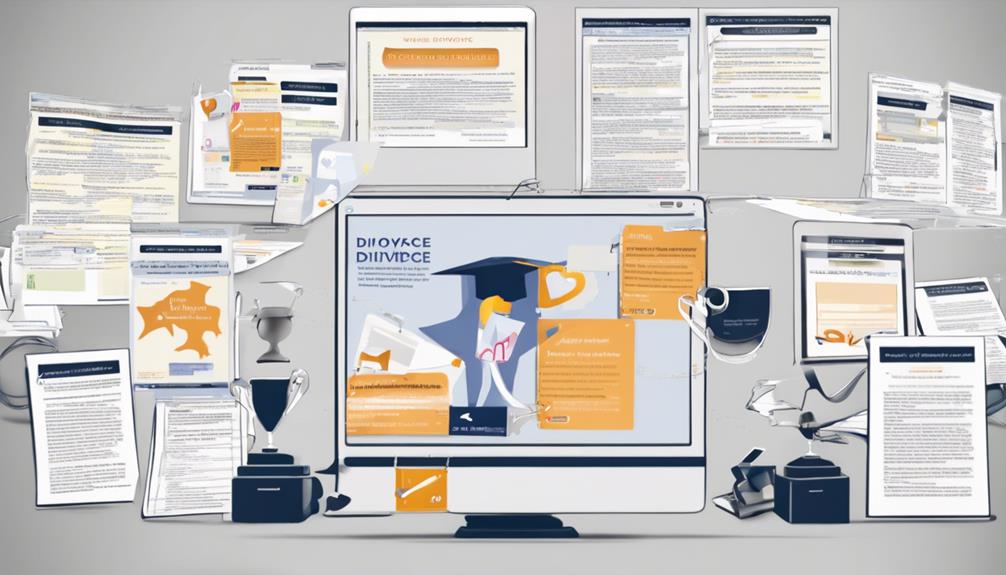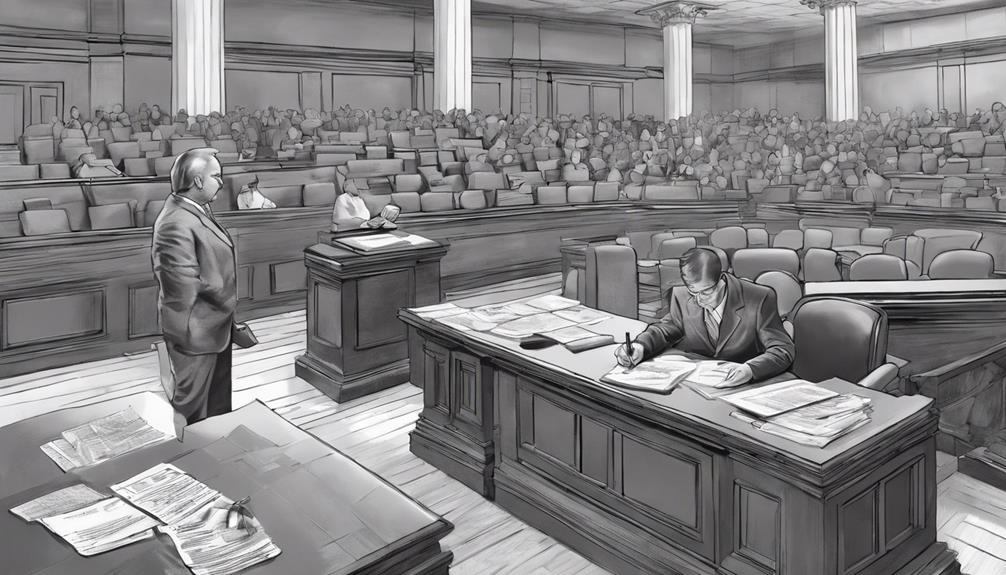Navigating a Texas divorce can be made more efficient by adhering to crucial steps. Initially, ensure you meet the residency requirements for both the state and county. Fill out all paperwork meticulously, especially when disclosing financial information. Properly notify your spouse and remain transparent about all financial details. Carefully review and sign all documents, making sure not to miss any submission deadlines or fees. Utilize guides for accurate completion and ensure all necessary documents are properly notarized. Consider utilizing online platforms and mediation to facilitate a smoother process. Seeking legal advice can offer clarity and support throughout the proceedings. By following these steps, you can ensure a simplified divorce process in Texas. For those delving deeper into the topic, further insights are available.
Key Takeaways
- Ensure accurate completion of all necessary forms for Texas divorce filing.
- Serving filed-stamped petition promptly notifies the spouse.
- Full disclosure of financial information aids in fair asset division.
- Notarization of signatures is essential for legal validity in court orders.
- Utilize online platforms and mediation services for simplified divorce procedures.
Residency Requirements
Understanding the residency requirements for filing a divorce in Texas is essential for a smooth legal process. In Texas, at least one spouse must have lived in the state for a minimum of 6 months before filing for divorce. Additionally, the spouse initiating the divorce must be a resident of the county where they plan to file for at least 90 days. Meeting these residency requirements is important as it establishes the court's jurisdiction over the divorce case. Failure to meet these requirements can lead to delays or complications in the divorce process.
Ensuring that both the state and county residency requirements are met is critical to guarantee that the divorce is handled by the appropriate Texas court. By abiding by these residency regulations, you can help streamline the legal proceedings and avoid unnecessary obstacles. It's important to carefully consider these requirements before initiating the filing process to prevent any complications that may arise from not meeting the residency criteria set forth by the state of Texas.
Completing Paperwork

When completing the paperwork for a Texas divorce, it's important to make sure all necessary forms are accurately filled out in compliance with state laws. Confirm that all personal information, financial details, and relevant dates are correctly included in the divorce forms. Attach any required documents or supporting evidence as outlined in the paperwork. Take the time to review the completed forms meticulously for any errors or missing information before submitting them to the court.
If you find the paperwork overwhelming or confusing, don't hesitate to seek legal assistance. A legal professional can help guarantee that all the necessary paperwork is completed correctly and in alignment with Texas divorce regulations. By working with a lawyer, you can navigate the complexities of the divorce process with confidence and peace of mind. Remember, thorough and accurate completion of paperwork is vital to moving forward smoothly in your divorce proceedings.
Notifying the Spouse
To notify the spouse in a Texas divorce, serving them with a copy of the filed-stamped petition is an important step in the legal process. When you file for divorce, serving your spouse guarantees they're officially made aware of the proceedings. You can choose to serve the petition directly or enlist the help of a process server for legal notification.
It's vital to file proof of service or a signed waiver of service to confirm that your spouse has received the necessary documents. Remember, failing to respond within the specified timeframe could result in a default judgment being issued in the divorce process.
In cases where personal service of the petition proves challenging, alternative options such as obtaining a court order for service may be pursued to move the process forward efficiently. Taking these steps promptly can help streamline the divorce process and make sure that all parties are informed and involved as required by law.
Sharing Financial Information

Sharing financial information during a Texas divorce is essential for ensuring transparency and facilitating a fair division of assets and liabilities.
- Full Disclosure: Disclose all financial details, including assets, liabilities, income, and expenses, to promote openness and fairness.
- Document Everything: Provide documentation like bank statements, tax returns, pay stubs, and investment portfolios to support the shared financial information.
- Compliance is Key: Follow court orders and requests for financial disclosure to assist in the equitable distribution of assets and liabilities.
- Professional Support: Consider seeking guidance from financial advisors or accountants to accurately assess and present financial information for the divorce proceedings.
Reviewing and Signing Documents
Before completing a divorce, it's essential to review and sign all necessary documents accurately. Reviewing these papers guarantees that agreements on important matters like child custody and asset division are correctly detailed.
Once the documents are signed, they indicate acceptance of the terms outlined in the settlement agreement and final decree.
Document Preparation Process
Upon completion of thoroughly reviewing all divorce documents for accuracy and completeness, the next essential step is to sign the finalized documents in accordance with the specific requirements set by the court or a notary. Here are four vital points to keep in mind during the document preparation process:
- Confirm that all personal details and terms of agreement are accurately reflected.
- Seek legal guidance to understand the implications of each document.
- Sign the documents in the presence of a notary or as per court instructions.
- Keep copies of all signed divorce documents for personal records.
Ensuring these steps are followed diligently will help streamline the Texas divorce process and provide clarity and security moving forward.
Importance of Signatures
Facilitate a smooth progression of the Texas divorce process by emphasizing the significance of reviewing and signing divorce documents to validate terms and commitments. Signatures on divorce papers indicate agreement and comprehension of terms, while also demonstrating consent to the conditions of the divorce settlement.
Scrutinizing documents guarantees precision in legal terms and obligations, ensuring that both parties are informed of their duties. In order for the documents to be legally enforceable, both parties must sign the final divorce papers.
Properly signed paperwork streamlines the finalization of the divorce process, ensuring that all parties are bound by the agreed-upon terms and expediting a more efficient resolution.
Attending Court Proceedings

When attending court proceedings for a Texas divorce, parties must present evidence and testify to support their claims. Here are some key points to ponder during this vital phase:
- Legal Obligation: Attending court hearings is necessary to finalize the divorce process in Texas.
- Presenting Evidence: Parties have the opportunity to showcase evidence supporting their positions on child custody, support, and asset division.
- Testifying: Testifying in court allows individuals to elucidate their perspectives directly to the judge.
- Judicial Consideration: Judges carefully assess all evidence presented during court proceedings before making decisions regarding child custody and asset division.
Participating actively in court proceedings ensures that your voice is heard and that all relevant information is taken into account before finalizing the divorce. It's a critical step in the process that leads to the resolution of legal matters and the official end of the marriage.
Filing Final Papers

When filing final papers for a Texas divorce, it's important to have a checklist of all the required documents, ensuring nothing is missed during this critical step.
Notarization and signatures must be completed accurately to validate the final decree of divorce, so attention to detail is essential.
Understanding submission deadlines and associated fees is essential to avoid any delays in the finalization of the divorce process.
Required Documents Checklist
What essential documents are required when filing the final papers for a Texas divorce? Here's a checklist to make sure you have everything you need:
- Final Decree of Divorce: Outlines the terms of the divorce settlement, including property division and child custody arrangements.
- Certificate of Divorce: Official document proving the marriage dissolution, important for legal purposes.
- Parenting Plan: Details custody agreements, visitation schedules, and co-parenting responsibilities.
- Financial Affidavit: Provides a breakdown of each spouse's financial information, such as income, expenses, assets, and debts.
Making certain you have these documents prepared and in order will help streamline the final stages of your divorce process in Texas.
Notarization and Signatures
To guarantee the legal validity and smooth processing of final divorce documents in Texas, notarization of signatures is a vital step. Properly notarized signatures on these papers are essential for the authenticity and enforceability of court orders.
By having signatures witnessed and notarized, potential disputes regarding the parties' consent and agreement are minimized. This process ensures that the final divorce documents meet the necessary legal standards for court acceptance.
Without the required notarization, the enforceability of the divorce decree may be compromised. Hence, making sure that all signatures on the final divorce papers are notarized is essential for a seamless and legally sound divorce process in Texas.
Submission Deadlines and Fees
Ensuring timely submission and payment of fees is essential for efficiently concluding the Texas divorce process within the required timeframe. Here are some key points to keep in mind regarding submission deadlines and fees:
- The final divorce decree must be submitted to the court within 60 days after the divorce hearing.
- Missing the submission deadline can lead to delays in finalizing the divorce process.
- Courts in Texas may charge filing fees for submitting the final divorce papers.
- Failure to pay the required filing fees can impede the completion of the divorce proceedings.
Utilizing Downloadable Guides

By utilizing downloadable guides, individuals can efficiently navigate the complexities of the Texas divorce process with clear step-by-step instructions and essential document templates. These guides offer valuable assistance by providing detailed explanations on filling out divorce forms accurately, including important documents like the Petition for Divorce and Settlement Agreement.
They also highlight key deadlines, legal terms, and requirements to guarantee proper completion of all necessary paperwork. Accessing these downloadable guides can streamline the divorce process, helping individuals understand the legal procedures involved and empowering them to take charge of their own divorce proceedings.
With these resources at hand, individuals can tackle the Texas divorce process more confidently and efficiently, ultimately saving time and reducing stress. Embracing the use of downloadable guides is a proactive step towards achieving a smoother divorce process, granting individuals the freedom to navigate the legal terrain with clarity and ease.
Using Online Plans and Mediation

Online divorce platforms streamline the paperwork process, providing clear instructions and reducing errors.
Mediation services offer a neutral space for parties to discuss terms and reach agreements peacefully.
Online Divorce Platforms
Utilizing online divorce platforms offers a convenient and efficient way for couples in Texas to navigate the divorce process. These platforms provide accessible legal forms and guidance for completing necessary paperwork. Here are four reasons why online divorce platforms can be beneficial:
- Access to legal forms and step-by-step instructions.
- Online mediation services for dispute resolution.
- Streamlining the process for quicker completion.
- Saving time and reducing costs associated with traditional divorce proceedings.
Benefits of Mediation
Exploring the benefits of mediation through online plans and services reveals a practical and efficient approach to resolving divorce matters. Online mediation connects divorcing couples with professional mediators who specialize in conflict resolution, facilitating productive discussions and guiding parties towards fair agreements.
This cost-effective alternative to traditional legal processes saves time and money, offering a secure environment for negotiations. Mediators assist in addressing concerns and promoting open communication to reach mutually beneficial outcomes outside of court.
Simplifying Legal Processes
Shifting from exploring the benefits of mediation, we can simplify legal processes in Texas by leveraging online plans and mediation services. Here's how we can make the legal process smoother and more efficient:
- Online divorce plans provide step-by-step guidance for paperwork and requirements.
- Mediation services help parties communicate effectively and reach agreements on key issues.
- Online resources offer convenient access to legal forms and information.
- Mediation facilitates conflict resolution outside of court, reducing time, costs, and emotional stress.
Seeking Legal Consultation

Legal consultation with a divorce attorney in Texas is necessary for comprehending the complexities of residency requirements, waiting periods, and legal procedures involved in the divorce process. Seeking guidance guarantees accurate paperwork filing, compliance with state laws, and maneuvering the intricacies of legal terms.
By having legal representation, you can negotiate fair terms, make well-informed decisions, and aim for amicable resolutions during the divorce proceedings. Consulting with a legal professional simplifies communication between parties, protects individual rights, and increases the likelihood of achieving a satisfactory settlement.
It's vital to seek legal counsel early on to streamline the process, address any concerns promptly, and safeguard that your rights are upheld throughout the divorce proceedings. Remember, legal consultation empowers you to make informed choices, understand the legal landscape, and navigate the Texas divorce process with confidence.
Frequently Asked Questions
How Long Does It Take to Get a Simple Divorce in Texas?
It typically takes a minimum of 60 days for a simple divorce in Texas. This waiting period allows reflection and resolution. If terms are agreed upon, like property and child custody, the process can move faster.
What Are the Steps to Getting a Divorce in Texas?
Managing a Texas divorce involves submitting a petition, serving legal notice, obtaining temporary court orders, negotiating with the spouse, and finalizing with a judge's decree. This process requires patience, cooperation, and legal guidance for a smoother change.
How Can I Speed up My Divorce in Texas?
To speed up our divorce in Texas, we aim for an uncontested process, file paperwork accurately and on time, attend all meetings promptly, cooperate with each other, and consider hiring a skilled attorney for guidance.
What Is a Wife Entitled to in a Divorce in Texas?
In a Texas divorce, the wife may be entitled to a fair share of marital property based on contributions. Factors like marriage duration and financial inputs are considered. Seeking legal advice can clarify entitlements.
Can the Simplified Texas Divorce Process still be finalized in 7 essential steps?
Yes, finalizing a Texas divorce can still be completed in 7 essential steps, which include filing the petition, serving the spouse, financial disclosures, negotiation, signing the agreement, attending the final hearing, and obtaining the final decree. This simplified process helps couples dissolve their marriage efficiently and at a lower cost.
Conclusion
To sum up, simplifying the Texas divorce process involves following these 10 steps carefully. By meeting residency requirements, completing paperwork, sharing financial information, and seeking legal consultation, the process can be streamlined and straightforward.
Utilizing online resources, downloadable guides, and mediation can also help make the process more manageable.
By taking these steps, individuals can navigate the complexities of divorce with greater ease and efficiency, ensuring a smoother shift for all parties involved.










